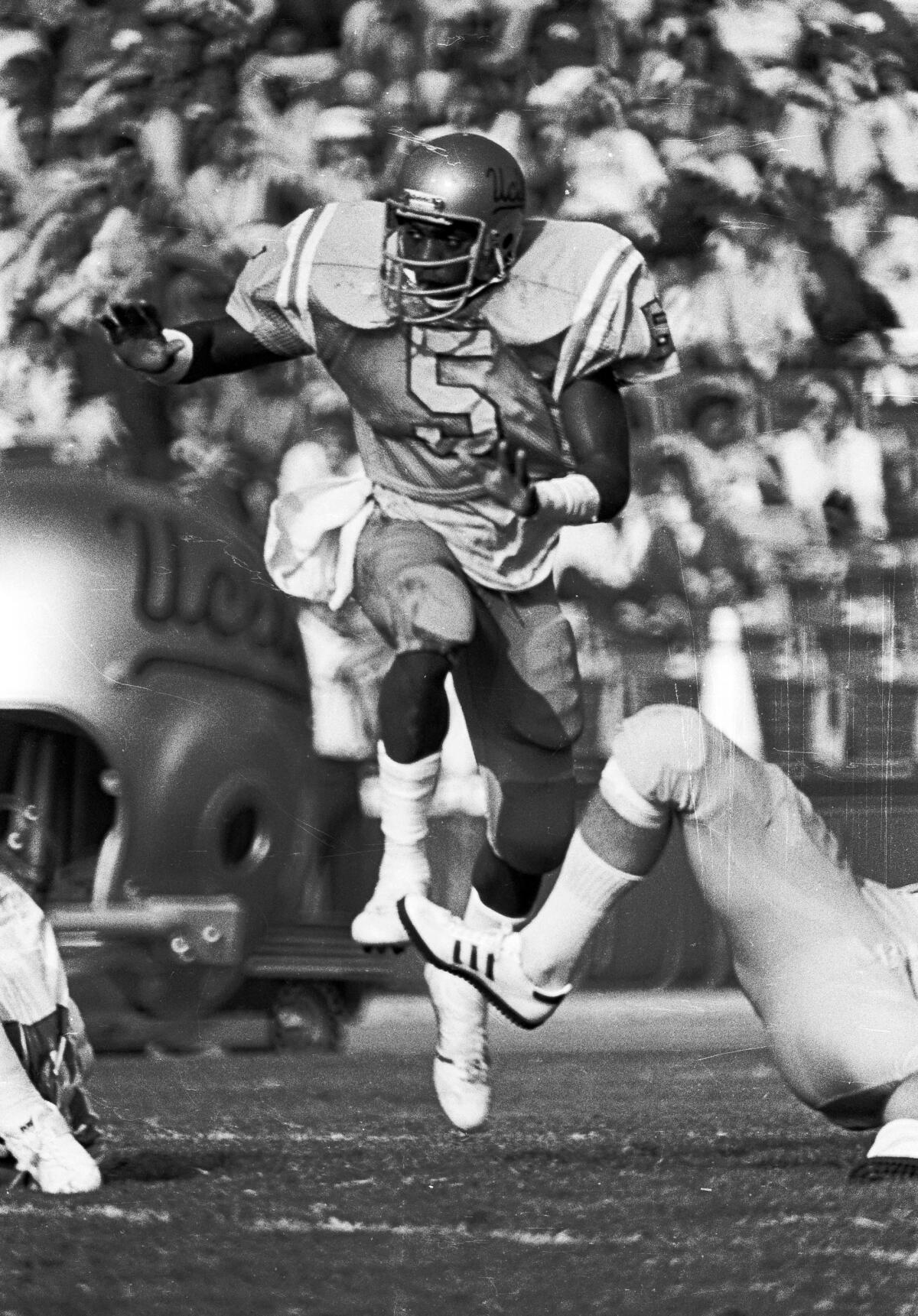On a flight to Houston to play in his first college football game, Kenny Easley was told that he would split time at free safety with a veteran UCLA teammate.
“That’s what happened,” Easley told The Times in 2017, recounting the story 40 years later. “Michael Coulter started the game and played the first two quarters, I played the second two and Michael never played again.”
Such was the dominance of a player who would be called The Enforcer for the way he inflicted his will on college and NFL opponents. Easley finished that first season with nine interceptions and 93 tackles, school records for a true freshman, and was just getting started on the way to becoming the first player in Pac-10 history to be selected for the conference’s first team all four seasons.
Easley, one of the most revered players in school history, died Friday from unspecified causes, the school announced. He was 66. Easley had long battled kidney issues that forced the five-time Pro Bowler to retire prematurely in 1987 after spending all seven of his NFL seasons with the Seattle Seahawks.
“We are deeply saddened by the passing of Seahawks legend Kenny Easley,” the team said in a statement. “Kenny embodied what it meant to be a Seahawk through his leadership, toughness, intensity and fearlessness. His intimidating nature and athletic grace made him one of the best players of all-time.”
Much of that resolve was forged thanks to a childhood game that Easley called dynamite pigskin. A pack of kids would gather on the athletic fields in Easley’s hometown of Chesapeake, Va., and a football would be tossed into the air.
Safety Kenny Easley also returned punts for UCLA.
(Courtesy UCLA Athletics)
Whoever caught it would take off running and everybody else would try to catch him until the ball carrier found himself hopelessly surrounded, forcing him to throw the ball back into the air, where the game earned its dynamite nickname. The game would go on for hours until everyone was bruised and exhausted.
One of the nation’s top prospects out of high school, Easley appeared bound for Michigan, telling everyone he was going to play for the Wolverines. But on the day of his college announcement, Easley blurted out that he was going to play for UCLA, his other finalist, during a ceremony at his high school auditorium.
“So just like that, the proverbial genie is out of the bottle and it’s on videotape that I’m going to UCLA,” Easley would recall many years later. He suspected he changed his mind because the Bruins had said from the start they were recruiting him to play free safety while Michigan wanted him as a quarterback, his other high school position.
Easley tallied 19 interceptions during four college seasons, which remains a school record. Having made 13 interceptions during his first two seasons, Easley developed a ready explanation for why he couldn’t sustain that pace.
“They didn’t throw the ball down the middle,” he said of opposing quarterbacks. “If I was playing against Kenny Easley, I wouldn’t throw the ball down the middle either.”
Easley also returned punts and was a punishing hitter, logging 105 tackles during his senior season in 1980. He would finish ninth in voting for the Heisman Trophy that year. His 374 career tackles remain the fifth most in UCLA history and he became the second player from the school to earn consensus All-American honors three times, joining linebacker Jerry Robinson.
“Kenny Easley was the most competitive person I’ve ever met in my life,” Robinson wrote in an email to The Times. “No matter what he was doing, whether it was sports or life, he was in it to win it! Whether it was football, basketball, pick-up softball games, playing cards, high diving into the swimming pool or golf, everything he did he wanted to be the best at it. And he was the best at it. He was the greatest all-around athlete that I have ever played with. RIP ‘Force 5’.”
The Seahawks selected Easley with the fourth pick in the 1981 draft, and he went on to make 32 interceptions in seven seasons. But his time with the franchise ended acrimoniously after he accused the team of providing medicine that led to his kidney problems. The sides would later resolve their differences. Easley was named one of the 50 greatest players in franchise history.
Elected into the college and pro football halls of fame, Easley had his No. 5 jersey retired by UCLA in 1991 and was also enshrined in the school’s athletics hall of fame.
